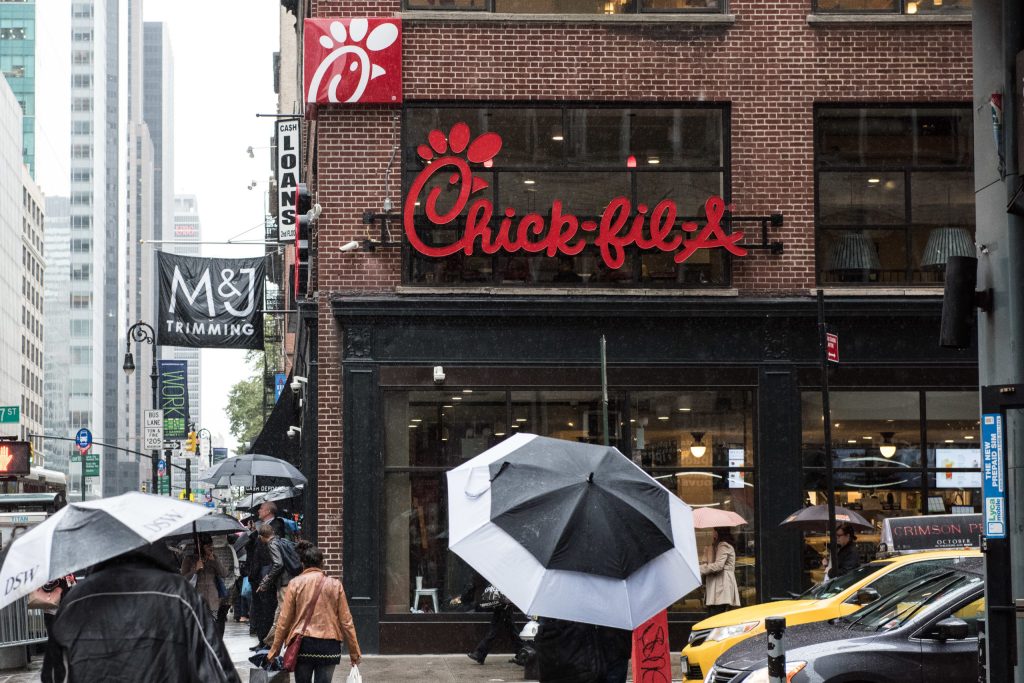Alas, Chick-fil-A has fallen. The last outpost of conservative principles has surrendered to the massed ranks of the SJWs. I feel as if I am surveying the sack of Rome, and the gates have been opened to the Visigoths.
I am being sarcastic, in case somebody screenshots this and posts it on Twitter with ‘who’s the real snowflake, lol’ or ‘cry more, bitch’. (Who am I kidding? Someone has done this already and stopped reading.) Of course, Chick-fil-A has caved. Conservatives might have justly pointed how ludicrous it was for the fast-food restaurant chain to have been forced out of Britain and picketed in the States because of its traditional Christian stance but what can you expect from big business?
Conservatives like to chirrup ‘go woke, go broke’ but while companies can damage themselves with progressive overreach, such as Gillette with their preternaturally condescending anti-‘toxic masculinity’ advert, most if not all major corporations have saturated their marketing with feminist, LGBT and multicultural imagery with no ill-effects. Chick-fil-A might have increased their profits since they began facing protests for their owners’ donations to anti-gay marriage groups but their exclusion from college campuses and international markets does not bode well for their future success. This, doubtless, played a role in their decision to stop offering charitable donations to the Salvation Army.
Mainstream conservatives are displeased. ‘This decision makes absolutely no sense,’ Dave Rubin flusters, ‘Chick-fil-A was actually cool because it stood up to the progressive mind virus which is cancel culture.’ ‘Now they’ve caved at the behest of the censorious left,’ adds Ben Shapiro. ‘Today, Chick-fil-A betrayed loyal customers for dollars,’ Mike Huckabee huffs. Yes, it is almost as if their highest value is maximizing profits.
Now, to be fair, it makes sense for these conservatives to attempt to do their best to dent Chick-fil-A’s bottom line if they do not want them to join the many glittering castles of ‘Woke Capital’. But it is also important to be clear that the ‘woke’ part is not the only problem. Conservatives, who tend to be economic liberals, often think of business as a natural ally, but this is naive. Businesses tend to follow the profit motive. This applies as much to online gambling businesses, pornographers and drug salesman as anyone else. Now, you can draw whatever conclusions you like from this, and I don’t want to recapitulate recent arguments about governments and the common good again, but what you cannot do is claim that this coheres neatly with the long-term continuation of a social order.
It is important to emphasize, though, that the profit motive is not the only factor behind Woke Capital. Ross Douthat hit on a subtler economic motive, saying:
‘…a certain kind of virtue-signaling on progressive social causes, a certain degree of performative wokeness, is offered to liberalism and the activist left pre-emptively, in the hopes that having corporate America take their side in the culture wars will blunt efforts to tax or regulate our new monopolies too heavily.’
This sounds true. It brings to mind Hillary Clinton’s hilarious line, ‘If we broke up the big banks tomorrow…would that end racism? Would it end sexism?’ Mainstream Democrats like Clinton have employed a radical commitment to ‘intersectional’ issues as long as ‘class’ is omitted to appease their donor base. So, this is insightful. But it seems insufficient. Take the new Sprite advert, which shows mothers and fathers binding the breasts of their transgender kids or accompanying their sons to Pride rallies.
Of course, I do not think this advert exists solely to raise their profit margins. There are not tens of millions of LGBT activists running out to buy sugary drinks in gratitude. I do not expect Sprite executives imagine that the advert will convince Alexandria Ocasio-Cortez that soft drink companies are her comrades. While I doubt that corporations are at all concerned about the atomizing individualism of Western culture, I do not think that it drives decisions in an active conspiratorial sense. A cause, I suspect, is what the British historian Robert Conquest identified in his second law of politics:
‘Any organization not explicitly right-wing sooner or later becomes left-wing.’
The ad agencies, marketing and human resources departments of major corporations are crammed with young urban professionals who graduated from liberal arts colleges and love to insert progressive imagery into their campaigns. Take Grey, the advertising agency that created the now notorious Gillette adverts. Their campaigns insert feminist imagery into not just American but Indian, Malaysian and Lebanese media. Like that or loathe it, these people are true believers.
Of courses, their campaigns must be shaped by what converges with the interests of their shareholders. None of them are going to push for a dramatic increase in the minimum wage or criticize the human rights abuses of the Chinese or Saudi Arabian governments. Social justice causes related to sexuality, race and gender hit the sweet spot of being cloyingly progressive without threatening the bottom line. Advertising that kills two birds with one stone: push the message and push the product. Edward Bernays, the pioneer of modern public relations, wrote in Manipulating Public Opinion:
‘This is an age of mass production. In the mass production of materials a broad technique has been developed and applied to their distribution. In this age, too, there must be a technique for the mass distribution of ideas.’
Why not both?
None of this is to say that business is necessarily an enemy of conservatives. The best societies contain various different interests, uneasily balanced, and profit-seeking businesses are among them. But conservatives should not imagine that these businesses are their friends. Otherwise, they will continue running around like headless, well — chickens.



















